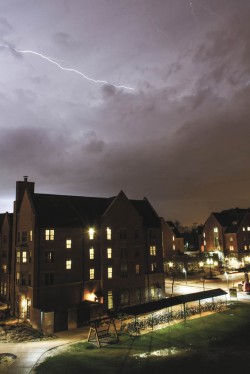Administration | News
Students sleep through a.m. tornado warnings
Although a tornado touched down in University City Wednesday night, many students slept through the early-morning alarms as their peers sought shelter.
Many students woke up to tornado sirens around 5:30 a.m. Thursday morning, but the Washington University Emergency Notification System otherwise only alerted students about the tornado warning via email.
The South 40 House is visible underneath stormy skies Thursday night. Tornado sirens sounded throughout the day as severe weather conditions persisted around campus.
Emergency Management Program Director Mark Bagby said that the University does not send out text message alerts when severe weather warnings take effect because students can sign up for alerts through local television stations. He also said that many students should automatically receive alerts about severe weather through the federal government’s Wireless Emergency Alerts system, which transmits weather alerts and other information such as AMBER Alerts to cell phones.
Junior Hyo Lee, who lives in the Village, said that although a Wireless Emergency Alert notification woke her up, she and her suitemates were not sure what to do once they were awake until their resident advisor told them to seek shelter in the basement. Others on her floor, however, did not wake up.
“When we were going down the stairs, I saw the RA knocking on everyone’s door, so I thought everyone went downstairs, but the day after, I was talking [with my friends] and one of my friends said she slept through it,” Lee said.
Lee said she thought texting students would be a better way to reach them than email alerts.
“I think texting might work better than email. I get alarm notifications for email, but I don’t really think of it as important,” Lee said.
Freshman Megha Varghese, who lives in Beaumont House, said that she and her roommate both slept through the sirens, although she did see that she had received a Wireless Emergency Alert notification later in the morning. She said that she does not receive notifications on her phone when she receives emails but does when she receives texts, so she probably would have woken up if she had received a text from the University.
Bagby said that the Office of Residential Life typically sends out a list of best practices during a tornado warning to residential college directors, RAs and fraternity house managers after spring break. However, he said that the best way for students to handle emergency situations is to use common sense.
“It seems like a lot of time people get in that Wash. U. bubble, and they’re like, ‘I don’t know what to do.’ And it’s like, what would you do if you were home or in a hotel?’” Bagby said. “The same thing here at Wash. U. would apply like at home…It seems like a lot of common sense and it is, but sometimes people just don’t think about that, and they need to.”

